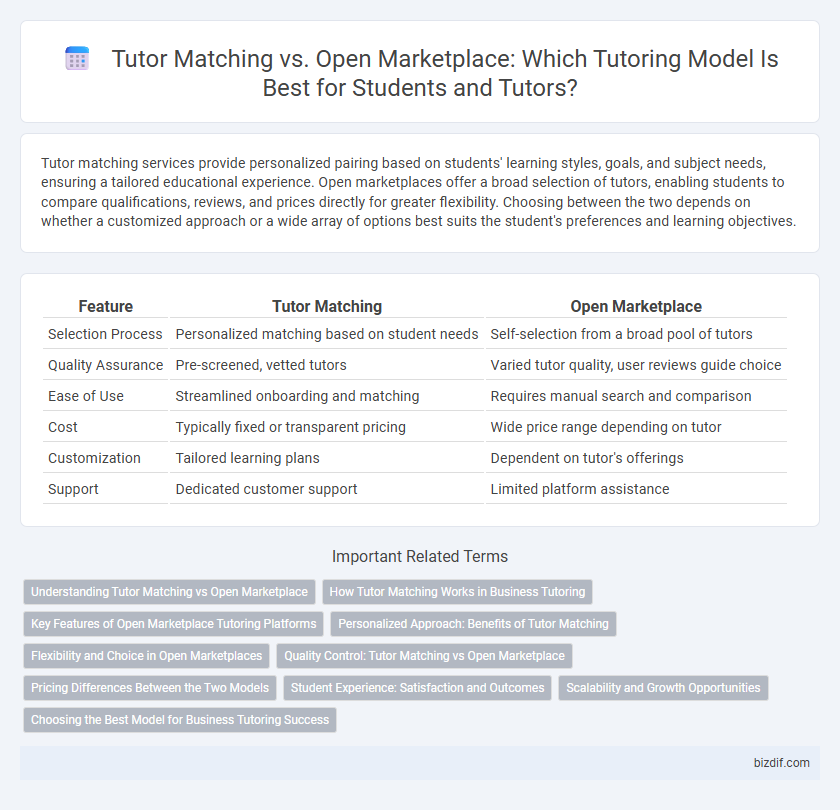Tutor matching services provide personalized pairing based on students' learning styles, goals, and subject needs, ensuring a tailored educational experience. Open marketplaces offer a broad selection of tutors, enabling students to compare qualifications, reviews, and prices directly for greater flexibility. Choosing between the two depends on whether a customized approach or a wide array of options best suits the student's preferences and learning objectives.
Table of Comparison
| Feature | Tutor Matching | Open Marketplace |
|---|---|---|
| Selection Process | Personalized matching based on student needs | Self-selection from a broad pool of tutors |
| Quality Assurance | Pre-screened, vetted tutors | Varied tutor quality, user reviews guide choice |
| Ease of Use | Streamlined onboarding and matching | Requires manual search and comparison |
| Cost | Typically fixed or transparent pricing | Wide price range depending on tutor |
| Customization | Tailored learning plans | Dependent on tutor's offerings |
| Support | Dedicated customer support | Limited platform assistance |
Understanding Tutor Matching vs Open Marketplace
Tutor Matching offers personalized pairing by analyzing student needs, learning styles, and tutor expertise to ensure optimal compatibility and improved learning outcomes. In contrast, an Open Marketplace presents a broad selection of tutors, allowing students to independently review profiles, ratings, and prices without tailored guidance. Understanding the distinction helps students choose between curated support and autonomous selection based on their preferences and learning goals.
How Tutor Matching Works in Business Tutoring
Tutor matching in business tutoring involves a personalized process that aligns students with tutors based on specific business subject expertise, learning style, and professional experience. This targeted matching optimizes educational outcomes by ensuring that the tutor's skills and knowledge directly address the learner's needs in areas such as finance, marketing, or management. The process often leverages algorithms combined with human oversight to enhance compatibility and foster effective learning partnerships.
Key Features of Open Marketplace Tutoring Platforms
Open marketplace tutoring platforms offer a wide selection of tutors, enabling students to filter by subject, expertise, availability, and pricing for tailored learning experiences. These platforms often provide user reviews and ratings, transparent pricing structures, and flexible booking options to enhance trust and convenience. Real-time scheduling, instant messaging, and integrated payment systems further streamline the tutor-student interaction, promoting efficient and personalized education.
Personalized Approach: Benefits of Tutor Matching
Tutor matching offers a personalized approach by carefully pairing students with tutors who meet their specific learning styles, goals, and subject expertise, enhancing the effectiveness of each session. This method fosters stronger student-tutor rapport, leading to increased motivation and better academic outcomes. Personalized tutor matching reduces time spent searching and trial, ensuring a tailored educational experience that an open marketplace often lacks.
Flexibility and Choice in Open Marketplaces
Open marketplaces provide unparalleled flexibility by allowing students to browse diverse tutor profiles, compare qualifications, and select based on specific learning needs and schedules. Unlike tutor matching services that assign instructors, these platforms empower learners with direct control over their education through transparent reviews and pricing options. This increased choice enhances personalized learning experiences and adapts to varying academic goals.
Quality Control: Tutor Matching vs Open Marketplace
Tutor matching platforms implement rigorous quality control measures such as personalized vetting, background checks, and skill assessments to ensure high tutoring standards. Open marketplaces often rely on user reviews and ratings, which can lead to inconsistent quality and varied tutor reliability. Precision in tutor matching enhances student outcomes by aligning expertise with learning needs more effectively than the variable selection process found in open marketplaces.
Pricing Differences Between the Two Models
Tutor matching services typically charge higher fees due to personalized matching processes and curated tutor selections, ensuring quality and compatibility. Open marketplaces offer more competitive pricing by allowing direct communication between students and tutors, eliminating middlemen and reducing overhead costs. Pricing in tutor matching models often includes subscription or service fees, whereas open marketplaces adopt pay-per-session or hourly rates controlled by individual tutors.
Student Experience: Satisfaction and Outcomes
Tutor matching platforms provide personalized pairing based on student learning styles, goals, and subject needs, resulting in higher satisfaction and improved academic outcomes. Open marketplaces offer a broad selection of tutors but may overwhelm students with choices, leading to inconsistent quality and varied success rates. Personalized matching enhances engagement and progress tracking, making it more effective for tailored learning experiences.
Scalability and Growth Opportunities
Tutor matching platforms offer scalable growth by utilizing algorithms to efficiently pair students with qualified tutors, reducing administrative overhead and enhancing user experience. Open marketplaces provide vast growth potential through diverse tutor availability and competitive pricing, attracting a broader audience but often requiring robust moderation to maintain quality. Both models leverage technology to scale rapidly, yet tutor matching emphasizes personalized connections while marketplaces prioritize variety and accessibility.
Choosing the Best Model for Business Tutoring Success
Tutor matching platforms provide personalized pairing based on students' specific learning needs, competencies, and goals, ensuring higher engagement and tailored support. Open marketplaces offer a broad selection of tutors, fostering competitive pricing and diverse expertise but may lack consistency in quality assurance. Businesses aiming for tutoring success should weigh personalized matching benefits against the scalability and variety offered by open marketplaces to select the optimal model.
Tutor Matching vs Open Marketplace Infographic

 bizdif.com
bizdif.com